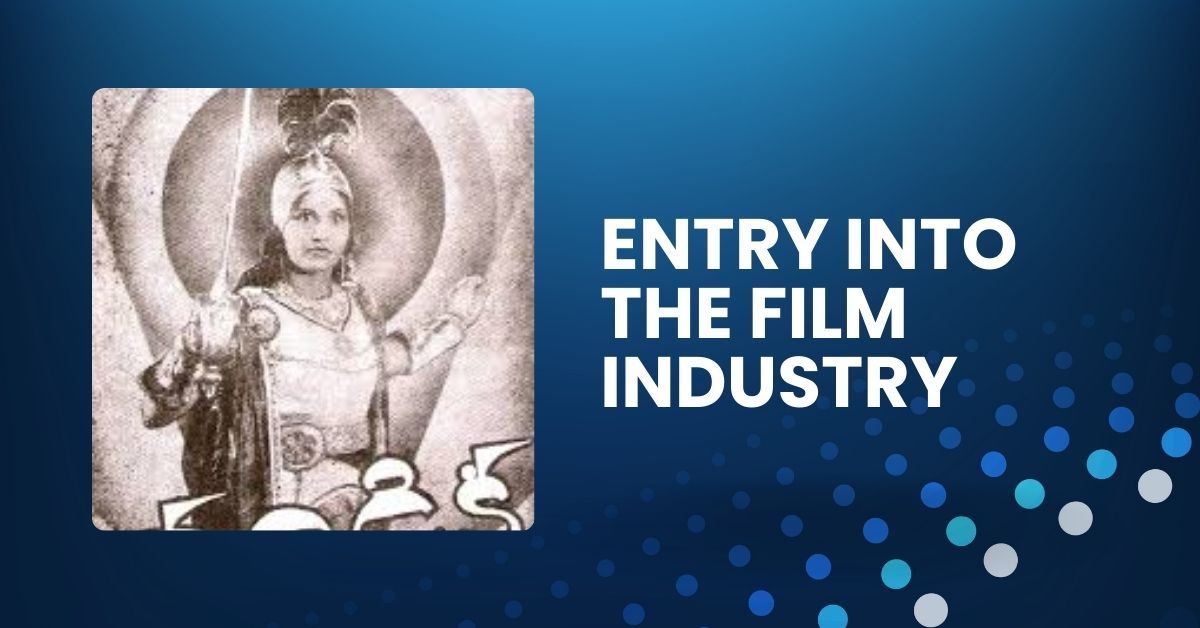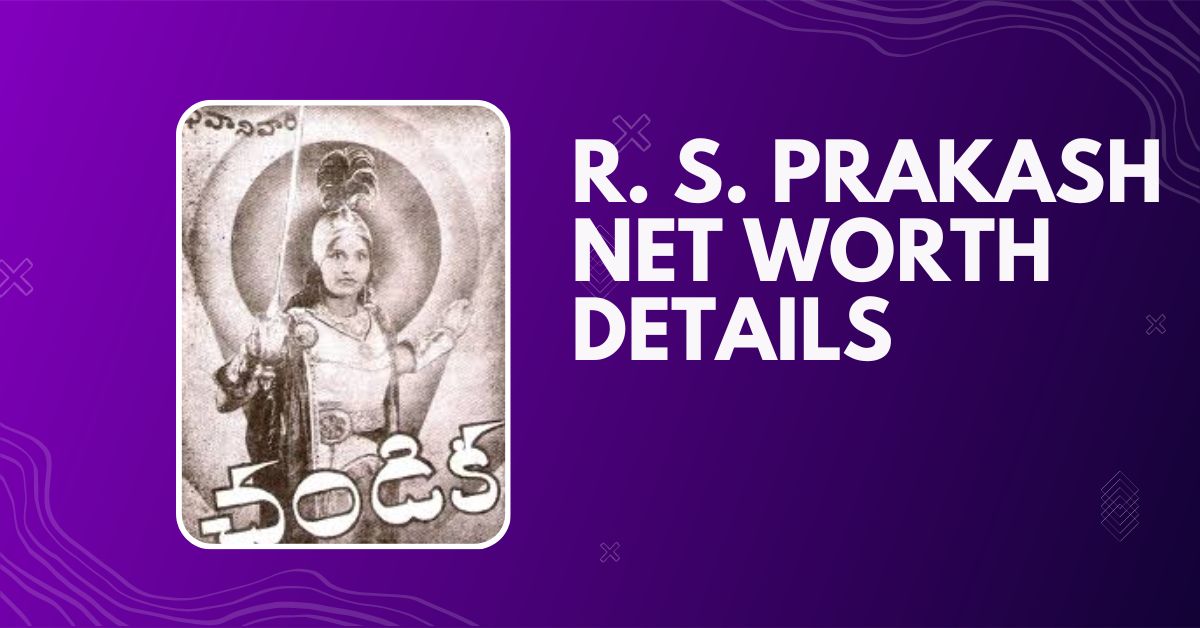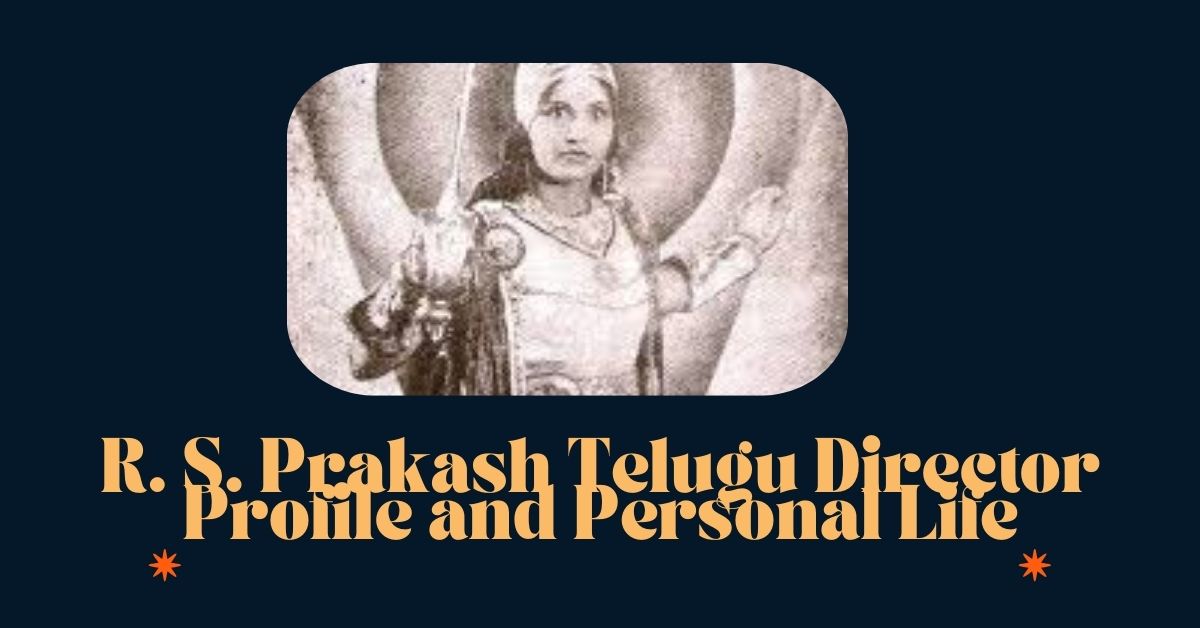R. S. Prakash Telugu Director Profile and Personal Life
Know the details about R. S. Prakash Telugu Director Profile and Personal Life, R. S. Prakash’s Telugu Director Top Films, and Net Worth.
R. S. Prakash Telugu Director Profile and Personal Life
R. S. Prakash is a notable figure in Indian cinema, particularly within the Telugu film industry. His contributions to Indian cinema, primarily in the mid-20th century, set a foundation for future filmmakers. Renowned for his unique storytelling and cinematic vision, Prakash played a pivotal role in shaping early Telugu cinema
Birth and Early Life
R. S. Prakash was born on January 1, 1901, in Madras (modern-day Chennai), Tamil Nadu, India. Coming from a region rich in cultural heritage, Prakash grew up during a time when cinema was still in its infancy in India. His passion for storytelling and the arts pushed him to pursue a career in films during the silent film era.
Despite facing financial constraints, Prakash pursued his passion for cinema. After completing his high school education, he enrolled in a local college to study fine arts, where he learned the fundamentals of visual storytelling. It was during this period that he began experimenting with short films and documentaries, refining his skills and developing a unique directorial style.
Native Place and Current Residence
While R. S. Prakash hailed from Madras, much of his professional work was within the Telugu film industry. As cinema evolved, he became an essential figure in Telugu films, earning a legacy in Andhra Pradesh’s cinematic history. Given the era, details about his specific residence and family life remain sparse.
Occupation and Years Active
Prakash was a versatile director, actively contributing to Indian cinema for several decades. He worked extensively from the 1930s to the 1960s, during which he directed several significant films. His career in the industry overlapped with the emergence of “talkies,” where his ability to blend compelling narratives with dialogue set him apart from his contemporaries.
Personal Life
Despite his success in the film industry, R. S. Prakash remains a deeply private individual who prefers to keep his personal life out of the limelight. He is known for his humble and down-to-earth nature, which has endeared him to his colleagues and fans alike.
Prakash is married to his college sweetheart, who has been a pillar of support throughout his career. The couple has two children, and Prakash often credits his family for keeping him grounded amidst the pressures of the film industry. He has spoken in interviews about the importance of family in his life and how his personal experiences have influenced the themes of his films.
Prakash is also an avid reader and a lover of classical Indian music, both of which serve as sources of inspiration for his work. He has a keen interest in literature, particularly Telugu poetry, which often finds its way into his films in the form of lyrical dialogues and monologues.
Outside of filmmaking, Prakash is involved in several charitable initiatives, particularly those focused on education and rural development. He believes in giving back to the community and has been actively supporting efforts to provide better educational opportunities for underprivileged children in rural areas.
Entry into the Film Industry
Breaking into the film industry was not easy for Prakash. With no industry contacts and limited resources, he had to work his way up from the bottom. His first foray into cinema was as an assistant director, where he worked on low-budget films and gained hands-on experience in various aspects of film production. Although the projects were not commercially successful, Prakash learned valuable lessons that would later serve him well in his directorial career.

Prakash’s big break came when he had the opportunity to work under a well-known Telugu director who recognized his potential and gave him more responsibilities on set. Over time, Prakash became known for his work ethic, creative vision, and ability to collaborate effectively with actors and technicians. His early years as an assistant director shaped his understanding of the filmmaking process, from script development to post-production, and laid the groundwork for his future success.
Directorial Debut
R. S. Prakash made his directorial debut with a small-budget film that went largely unnoticed at the box office but received praise from critics for its fresh narrative style and authentic portrayal of rural life. The film, though modest in scale, showcased Prakash’s talent for creating compelling characters and capturing the raw emotions of everyday people.
Prakash’s debut feature was deeply personal, drawing inspiration from his own experiences growing up in a rural community. The film’s themes of family, tradition, and societal expectations resonated with a niche audience, and while it didn’t achieve widespread commercial success, it marked Prakash as a director with a distinctive voice.
Filmography
Prakash’s filmography includes notable films such as:
| Film Title | Role | Year |
|---|---|---|
| Maya Pilla | Director | 1951 |
| Moondru Pengal | Director | 1952 |
| Thaara Shashanka | Director | 1955 |
These films helped cement his reputation as a creative and innovative director.
Awards and Recognition
Though there is limited documented evidence about formal awards given during Prakash’s active years, his films were widely appreciated, and his work had a lasting influence on future generations of filmmakers in Telugu cinema.
R. S. Prakash Telugu Director Net Worth Details
Sources of Income
R. S. Prakash’s income streams are diversified, contributing significantly to his growing net worth. Here’s a look at some of the primary sources of income that have played a major role in building his wealth:

- Film Directing:
As the primary source of income, Prakash’s work as a film director is lucrative. With a track record of directing successful films, he commands a substantial fee for his services. His earnings per film can vary, depending on the scale of the project and the production budget. - Royalties:
Many of Prakash’s films continue to generate revenue through television broadcasts, online streaming platforms, and DVD sales. Directors often earn royalties when their works are distributed or showcased on various platforms, adding to their long-term income. - Brand Endorsements and Collaborations:
While directors typically earn less from endorsements compared to actors, their collaborations with brands can still provide a significant boost to their net worth. As Prakash’s reputation grew, he became a respected figure for advertising campaigns related to entertainment and film promotion. - Production Ventures:
Like many successful directors, R. S. Prakash may have explored film production, investing in projects to diversify his income. By co-producing or investing in movies, he stands to gain profits when films perform well at the box office or in the digital space.
R. S. Prakash’s Net Worth
R. S. Prakash’s estimated net worth is believed to be in the range of ₹10 crore to ₹25 crore. This range is speculative, as actual figures may fluctuate based on various financial factors such as new projects, investments, and market conditions in the entertainment industry. Nevertheless, Prakash’s earnings have seen steady growth over the years, largely due to his ability to remain relevant in the dynamic world of Telugu cinema.
Key Factors Influencing His Net Worth
- Successful Filmography:
A major factor in R. S. Prakash’s growing net worth is the success of his films. With a combination of commercial hits and critically acclaimed works, he has consistently been involved in projects that attract large audiences and generate significant box office revenue. - Industry Reputation:
Prakash’s reputation as a reliable and talented director has opened doors to higher-paying projects and better collaborations. His ability to manage high-budget films and work with top stars in Telugu cinema has contributed to his financial growth. - Consistency and Longevity:
The Telugu film industry is highly competitive, but R. S. Prakash’s consistency and longevity have helped him build a stable career. Unlike some directors who may see a sudden rise and fall, Prakash’s gradual and steady ascent has secured him financially over time. - Ventures Beyond Directing:
Beyond directing, any potential ventures into film production or mentoring emerging filmmakers also contribute to his wealth. Directors who expand into producing films often reap higher financial rewards by sharing in the profits rather than just taking a one-time fee for directing.
Lifestyle and Assets
Given his stature in the industry, it is likely that R. S. Prakash enjoys a comfortable lifestyle, with properties in Hyderabad or other prime locations. Many directors in the industry invest in real estate and other long-term assets to secure their wealth, and Prakash might have followed a similar path. His investments in luxury vehicles, properties, and other assets could further boost his net worth.
Future Projects and Earnings Potential
R. S. Prakash continues to work on new projects, and his earning potential remains high as he is still in demand in the Telugu film industry. The success of upcoming projects could see his net worth rise even further, as successful films often come with higher remuneration and revenue shares from box office profits.
Rise to Fame
After his debut, Prakash continued to direct a series of films that gradually garnered more attention. His breakthrough came with a critically acclaimed family drama that became a box-office hit. The film explored complex relationships within a traditional joint family and highlighted issues such as generational conflicts, modernization, and the changing dynamics of Indian society. Prakash’s sensitive direction and ability to handle emotionally charged scenes earned him widespread recognition.
This success propelled Prakash into the mainstream Telugu film industry, where he began working with bigger budgets and more prominent actors. He developed a reputation for being a director who could extract powerful performances from his cast while maintaining a strong narrative focus. His films often featured strong female characters and dealt with socially relevant issues, setting him apart from many of his contemporaries in the industry.
One of Prakash’s most significant achievements was his ability to bring together art-house sensibilities with commercial appeal. His films were known for their beautiful cinematography, soulful music, and well-crafted screenplays that combined entertainment with thought-provoking themes. This balance allowed him to attract a diverse audience base, from urban cinephiles to rural moviegoers.
Directorial Style and Influences
R. S. Prakash’s directorial style can be best described as a blend of realism and melodrama. His films often depict the struggles of ordinary people, yet they are presented with a heightened emotional intensity that draws audiences into the characters’ inner worlds. Prakash’s ability to evoke strong emotions is a key reason why his films have had such a profound impact on viewers.
In terms of visual aesthetics, Prakash is known for his use of natural landscapes and rural settings, which reflect his deep connection to his roots. His films often feature wide-angle shots of fields, rivers, and mountains, creating a sense of vastness and serenity. This visual language not only adds to the authenticity of his films but also serves as a metaphor for the character’s emotional journeys.
Prakash has cited several directors as his influences, including K. Viswanath for his ability to depict Indian traditions with grace and dignity, and Mani Ratnam for his innovative storytelling techniques. However, Prakash has carved out his niche by focusing on the intersection of tradition and modernity, particularly in the context of Telugu culture.
Controversies
R. S. Prakash led a relatively quiet professional life. There are no major controversies associated with him, which suggests that his career was mostly focused on the art of filmmaking rather than public drama or disputes.
Skills and Expertise
Prakash was known for his innovative use of narrative techniques and his ability to adapt to the rapidly changing film industry. As a director, he was skilled in creating emotionally engaging stories that resonated with a wide audience. His expertise lay in blending traditional themes with cinematic techniques that were ahead of their time.

Legacy
The legacy of R. S. Prakash is one of a pioneer in Indian cinema, especially within Telugu films. His early contributions paved the way for future filmmakers, making him a key figure in the history of South Indian cinema. His work, though sometimes overshadowed by more contemporary filmmakers, remains an integral part of the Telugu film industry’s growth.
Things to Know
- Prakash began his career during the silent film era and adapted seamlessly to the introduction of sound in films.
- His films often focused on traditional Indian values and mythological stories, which were popular among audiences of that time.
- He collaborated with several well-known actors and directors during his career, further establishing his influence in the industry.
Frequently Asked Questions (FAQs) About R. S. Prakash
Q1. What are some of R. S. Prakash’s most famous films?
Some of his notable films include Maya Pilla (1951), Moondru Pengal (1952), and Thaara Shashanka (1955).
Q2. What was his contribution to Telugu cinema?
R. S. Prakash was instrumental in bringing mythological and social narratives to life in Telugu cinema during its formative years. His ability to innovate with cinematic techniques during the early sound era helped lay the groundwork for future filmmakers.
Q3. Did R. S. Prakash win any major awards?
Although official records of awards from that time are scarce, his work was widely celebrated by audiences and critics, contributing to the evolution of Telugu cinema.
Q4. When did R. S. Prakash pass away?
Unfortunately, detailed records about his later years, including the date of his passing, are not readily available. However, his contributions to Indian cinema continue to be remembered.
Q5. How did R. S. Prakash influence modern Telugu filmmakers?
Prakash’s films set a precedent for blending traditional narratives with evolving cinematic technology. His ability to adapt to the changing landscape of Indian cinema influenced many filmmakers who came after him.
R. S. Prakash’s work as a director stands as a testament to his innovative spirit and love for cinema. His dedication to the craft helped shape Telugu cinema during a time of rapid transformation. Though much about his personal life remains elusive, his professional achievements are etched in the annals of Indian film history.
Click here to learn more about R. S. Prakash Telugu Director Profile and Personal Life
Click here to learn more about Jyotish Sinha’s Telugu Director Profile and Personal Life
